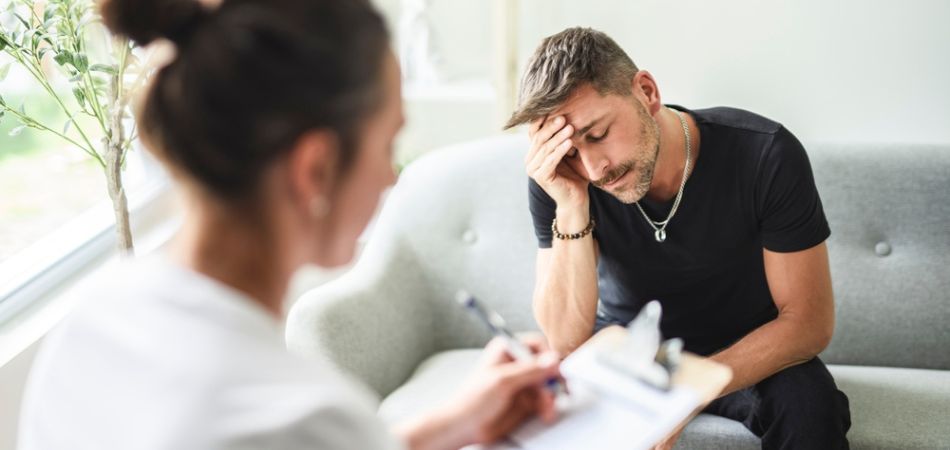
Written by:
Last Updated:
October 29th, 2025
Going through addiction recovery can be one of the greatest challenges your body and mind ever face. Trained experts are on hand to help with physical detox, but what of the deeper psychological drivers that keep a person returning to a substance?
This is where addiction counselling becomes an invaluable asset in lasting recovery.
This help guide illustrates the various types of counselling available in recovery, allowing you to make the choice that supports your sustained sobriety.
What is addiction counselling?
When you enter rehab, you’ll start off by addressing the physical aspects of recovery. Physical detox may present some withdrawal symptoms, which, with the help of professionals, you will overcome.
Then come the physiological drivers of addiction, which are often as complex, if not more so, than the physical drivers. Addiction counselling is used to help you understand, deconstruct and eventually reframe your thinking so you can better manage the psychological challenges in the recovery journey.
Long-term substance abuse and addiction affect the physical neuroplasticity of your brain, so once the drug is out of your system, addiction counselling and therapy help you unlearn destructive behaviours and re-learn new, healthy coping mechanisms.
In most cases, addiction counsellors have been through, or are currently in recovery themselves. It may not be a prerequisite that only a recovering person understands a recovering person, but it will often make them more relatable and enable you to share with them the way you feel. Addiction counsellors indeed often see helping others as profoundly fulfilling, and in turn, it helps reinforce their own determination to stay sober.
The difference between therapy and counselling
Broadly speaking, addiction counselling and therapy differ in a few ways. Counselling usually emphasises focusing on more specific, short-term issues faced in the here and now. Therapy is usually longer in duration and looks at diagnosed mental health conditions.
What makes counselling so essential in overcoming addiction?
What are the different types of counselling available?
If you’re going through the different types of recovery programmes available, you may see many different types of counselling and therapies offered. This can make an addiction counsellor a very valuable person to speak to, as they will likely have been through your situation and can suggest the best approach.
Addiction counsellors will be able to discuss the many types of counselling available in recovery, including:
CBT efficacy remains one of the well-researched forms of treatment for those with a substance use disorder (SUD). Its strength lies in enabling a person to practice stepping outside of themselves, to view their life more objectively. From here, a person is taught the destructive capabilities of “cognitive distortions,” leading them to reframe their thoughts and work on productive coping mechanisms.
Originally designed to support people with borderline personality disorder and those with suicidal thoughts, DBT is now widely recognised as effective in treating substance use disorders, as well as eating and mood disorders. Its focus is on resilience through four core skills:
- Mindfulness: Staying present in the moment rather than getting lost in past regrets and future anxieties.
- Distress tolerance: Learning ways to manage crises without making them worse.
- Interpersonal effectiveness: Strengthening communication and relationships with others.
- Emotional regulation: Gaining better awareness and control over emotional responses.
Rather than telling someone what to do, the counsellor’s role is to guide them towards uncovering their own reasons to change. MI typically follows four key processes:
- Engagement: Building a foundation of trust and openness between client and counsellor.
- Focusing: Identifying the client’s personal values, goals, and reasons for change.
- Evoking: Encouraging “change talk” through reflections and open-ended questions that draw out inner motivation.
- Planning: Supporting the client in turning motivation into action, once they feel ready to take practical steps forward.
These approaches may include practices such as meditation, yoga, acupuncture, art or music therapy, and even equine-assisted therapy. By encouraging healthier ways to process emotions, many people find a form of cathartic release in artistic expression. They can become a powerful complement to structured counselling, which helps recovery feel more personal.
How do I know if counselling will help my addiction?
It’s natural to wonder whether counselling is the right step for you or your loved one. The truth is, counselling can support recovery at almost any stage, whether you’re just starting to confront your substance use or you’ve already tried to quit multiple times.
I’m ready to take the next step in recovery
If you’re even considering addiction counselling, you’ve already taken one of the bravest steps: admitting that something needs to change. You don’t have to face this alone.
At Sanctuary Lodge, our counselling programmes combine evidence-based therapies with a supportive environment where healing can flourish. Call our admissions team today to discuss your options. The path to recovery is challenging, but with the right support, a healthier and more hopeful future is within your reach.





